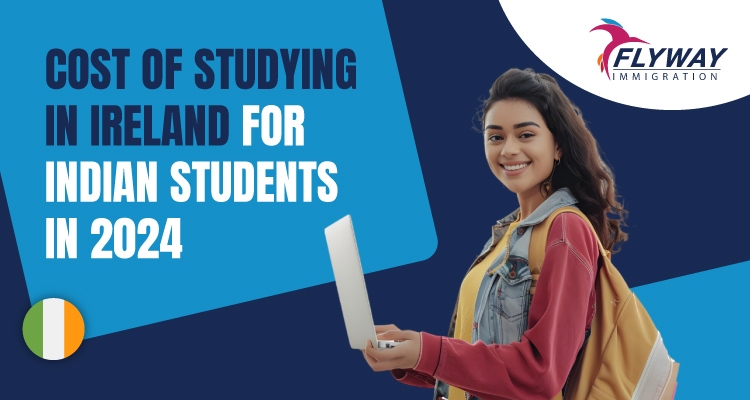
Most Commonly Repeated Spellings of IELTS Listening Words
23 February 2024
Malta Study Visa Checklist: A Comprehensive Guide for Indian Students
25 April 2024So, you've decided to pursue your higher education in Ireland – an excellent choice!
Ireland has become a very popular place for international students to study. This is because the country has excellent universities, an exciting and lively culture, and beautiful natural scenery.
However, before you start preparing for your journey, you'll need to obtain an Ireland student visa. The visa application process can be challenging, and unfortunately, many students face rejection.
In this comprehensive blog post, we'll dive deep into the reasons behind Ireland's student visa rejection in 2024. Understanding these factors is critical if you want to increase your chances of success.
Irish Student Visa Types For International Students
Before we delve into the reasons for visa rejection, let's familiarize ourselves with the different types of Irish student visas available to international students:
C-Type Study Visa
If you're planning to study in Ireland for a course that lasts less than three months, the C-Type Study Visa is the one you'll need. This visa is typically issued for short-term courses, language programs, or academic exchanges.
It's important to note that this visa doesn't allow you to work or engage in any paid employment during your stay in Ireland.
D-Type Study Visa
The D-Type Study Visa is designed for students pursuing longer-term academic programs, such as undergraduate or postgraduate degrees.
With this visa, you'll be permitted to study and, in some cases, work part-time for a maximum of 20 hours per week during the academic term and full-time during scheduled holidays.
Re-Entry/Multiple Entry
If your course requires you to leave and re-enter Ireland multiple times, you'll need to apply for a Re-Entry/Multiple Entry visa. This visa allows you to travel in and out of the country without having to apply for a new visa each time, provided you meet the necessary requirements.
The 7 Main Reasons Why Ireland Rejects Student Visas
Now that we've covered the different visa types, let's dive into the seven main reasons why Ireland student visa applications are rejected:
1 — Insufficient Financial Proof
One of the most common reasons for Ireland student visa rejection is the inability to provide sufficient financial proof.
The Irish immigration authorities require students to demonstrate that they have enough funds to cover their tuition fees, living expenses, and any other associated costs during their study period.
To avoid rejection on financial grounds, make sure you have a detailed breakdown of your expenses and provide appropriate documentation, such as bank statements, scholarship letters, or sponsorship letters from your family or organization.
Therefore, it's essential to present a clear and transparent picture of your financial situation to the visa officers.
2 — Incorrect Documents
Submitting incorrect or incomplete documents is another major reason for visa rejection.
The Ireland student visa checklist is extensive, and even a minor error or missing document can lead to your application being denied.
To mitigate this risk, double-check and triple-check that you have all the required documents before submitting your application. Furthermore, you need to also ensure that the information provided is accurate, up-to-date, and consistent across all documents.
If you're unsure about any aspect of the document preparation process, it's advisable to seek guidance from Ireland study abroad consultants or the embassy staff.
3 — Unacceptable Medical Issues
The Irish immigration authorities have strict guidelines regarding medical conditions that may affect a student's ability to study or pose a risk to public health.
Certain medical issues, such as contagious diseases or conditions that require long-term treatment, could result in visa rejection.
If you have any pre-existing medical conditions, it's crucial to disclose them honestly and provide the necessary medical reports and clearances. Concealing or misrepresenting your medical history can lead to severe consequences, including visa rejection or even deportation.
4 — Unimpressive Academic Record
A strong academic record is essential for obtaining an Ireland student visa. The visa officers will scrutinize your past academic performance to assess your ability to cope with the rigors of studying in Ireland.
If your grades or test scores are below the required standards, or if you have a history of poor academic performance, your visa application may be rejected.
That’s why, we strongly advise you to highlight any extenuating circumstances that may have affected your academic record and provide evidence of your potential for academic success, such as recommendation letters from professors or academic achievements.
5 — Criminal Records
Having a criminal record can significantly impact your chances of obtaining an Ireland student visa. The Irish immigration authorities take a firm stance on ensuring the safety and security of their citizens and visitors.
If you have any criminal convictions, it's imperative to disclose them truthfully during the application process.
Providing false or misleading information about your criminal history can result in immediate visa rejection and potentially bar you from future applications.
6 — No Intent of Return
The Irish immigration authorities want to ensure that international students have a genuine intention to return to their home country after completing their studies.
If the visa officers suspect that you might overstay or seek permanent residency, your visa application may be rejected.
To demonstrate your intent to return, you can provide evidence of strong ties to your home country, such as family obligations, employment prospects, or property ownership. It's also advisable to clearly outline your post-study plans and how your education in Ireland aligns with your long-term career goals.
7 — Wrong Type of Visa Selection
Applying for the wrong type of visa can lead to immediate rejection, even if you meet all the other requirements. It's crucial to carefully review the visa categories and select the appropriate one based on the duration and nature of your study program.
If you're unsure about which visa type to apply for, consult with Ireland study abroad consultants like Flyway Immigration or the embassy staff for guidance.
They can assist you in understanding the eligibility criteria and ensure that you apply for the correct visa type.
Ireland Study Visa Rejections with Codes
The Irish immigration authorities use specific codes to indicate the reasons for visa rejections.
Understanding these codes can help you better comprehend the reasons behind your rejection and take appropriate steps for reapplying.
Here's a table highlighting some common visa rejection codes and their meanings:
Ireland Study Visa Rejections with Codes
The Irish immigration authorities use specific codes to indicate the reasons for visa rejections.
Understanding these codes can help you better comprehend the reasons behind your rejection and take appropriate steps for reapplying.
Here's a table highlighting some common visa rejection codes and their meanings:
| Code | What They Mean |
|---|---|
| ID (insufficient documentation) | When the applicant didn't provide all the required documents, didn't translate them to English, or didn't sign the Ireland student visa application form properly. |
| F (finances) | When the applicant couldn't prove they have enough money to cover their living costs and tuition fees in Ireland. |
| PF or PR (public funds or public resources) | If a candidate has shown that they are going to rely on support from public funds or resources. |
| R (reference in Ireland) | Authorities are interested in knowing your intentions in Ireland. Here students have to submit a university admission letter. |
| P (passport) | When the applicant's passport is going to expire in the next 6 months or there were other passport-related issues. |
| VR PVR (visa refused and previous visa refusal(s)) | When a candidate's visa was refused earlier & the errors are still not rectified. |
| INCO (inconsistencies) | Inconsistencies in Ireland student visa application. |
| SP (student profile) | When the applicant had gaps in their education history without a valid reason, low English test scores, or picked an unsuitable course. |
| CP (course profile) | When the applicant failed to clearly explain why they want to study in Ireland. |
| OB (obligation) | When the applicant couldn't demonstrate they will leave Ireland after finishing their course. |
| OC (observe the conditions) | When the immigration officer wasn't convinced the applicant would follow Ireland's visa rules, like not overstaying, working illegally, or traveling without the right visa. |
Ireland Student Visa Success Rate & Rejection Rate
According to the latest statistics from the Irish Naturalisation and Immigration Service (INIS), the Ireland student visa rejection rate for the 2023-2024 academic year stands at between 1 to 4%. This means that out of every 100 applications received, around 4 were rejected.
While this rejection rate may seem low, it's important to note that a significant portion of these rejections can be attributed to incomplete or incorrect applications.
That’s why it’s critical to follow the guidelines and address the common reasons for rejection, you can significantly increase your chances of success.
The Ireland visa processing time in India typically ranges from 4 to 8 weeks, depending on the volume of applications and the completeness of your submission.
So, it's recommended to apply well in advance of your intended study start date to allow for sufficient processing time and, if necessary, the opportunity to reapply in case of rejection.
How To Reapply For Ireland Student Visa After Refusal?
If your Ireland student visa application is rejected, don't lose hope. You have the option to reapply, but it's crucial to address the specific reasons for rejection outlined by the visa officers.
Here's a step-by-step guide on how to reapply for an Ireland student visa after refusal:
1. Carefully review the refusal letter or email
The visa officers will provide detailed explanations for the rejection, which will serve as a roadmap for your next steps.
2. Address the reasons for rejection
If the rejection was due to insufficient financial proof, gather additional documentation, such as updated bank statements or sponsorship letters. If it was related to incomplete or incorrect documents, double-check and ensure all the required information is provided accurately.
3. Consider seeking professional assistance
If you're unsure about how to address the reasons for rejection, it might be beneficial to consult with Ireland study abroad consultants. They have expertise in navigating the visa application process and can provide valuable guidance.
4. Update any changes in your circumstances
If there have been significant changes in your personal or financial situation since your initial application, be sure to provide updated information and supporting documents.
5. Reapply with a fresh application
Once you have addressed the reasons for rejection and gathered all the necessary documentation, you can submit a new visa application. Be sure to follow the application process meticulously and double-check all the information before submitting.
It's important to note that reapplying does not guarantee visa approval, but it significantly increases your chances if you have addressed the previous concerns raised by the visa officers.
Ireland Student Visa Requirements For Indian Students
If you're an Indian student planning to study in Ireland , there are specific requirements you need to meet for your Ireland student visa application.
Here's a comprehensive Ireland student visa checklist for Indian students:
- Valid passport — Your passport should have a minimum validity of 12 months from the intended date of entry into Ireland.
- Acceptance letter — You'll need to provide a valid acceptance letter from a recognized Irish educational institution, clearly stating the course details, duration, and start date.
- Financial proof — As per the Irish immigration guidelines, you'll need to show evidence of having sufficient funds to cover your tuition fees, living expenses, and any other associated costs. This can be in the form of bank statements, scholarship letters, or sponsorship letters from family members or organizations.
- English proficiency test scores — If English is not your first language, you'll need to provide proof of English language proficiency through tests like IELTS or TOEFL.
- Academic transcripts — You'll need to submit your academic transcripts from your previous educational institutions, along with any relevant certificates or diplomas.
- Statement of Purpose — A well-crafted Statement of Purpose (SOP) can strengthen your application by highlighting your academic goals, interests, and future plans.
- Medical examination report — Depending on your country of residence, you may need to undergo a medical examination and provide a report confirming that you do not have any contagious or long-term medical conditions.
- Biometric information — As part of the application process, you'll need to provide your biometric information, such as fingerprints and photographs.
If you're unsure about any aspect of the application process, it's advisable to seek guidance from Ireland study abroad consultants in Nikol or the nearest Irish embassy or consulate.
Conclusion
Obtaining an Ireland student visa can be a challenging process.
But with proper preparation and understanding of the common reasons for rejection, you can significantly increase your chances of success.
Remember, the key to a successful visa application lies in providing accurate and complete documentation, demonstrating financial stability, maintaining a strong academic record, and clearly articulating your intentions and plans for studying in Ireland.
If you're feeling overwhelmed or unsure about any aspect of the application process, don't hesitate to seek assistance from Ireland study abroad consultants like Flyway Immigration.
We can provide valuable guidance and ensure that your application is as strong and compelling as possible. With the right preparation and mindset, you can turn your dream of studying in Ireland into a reality.




